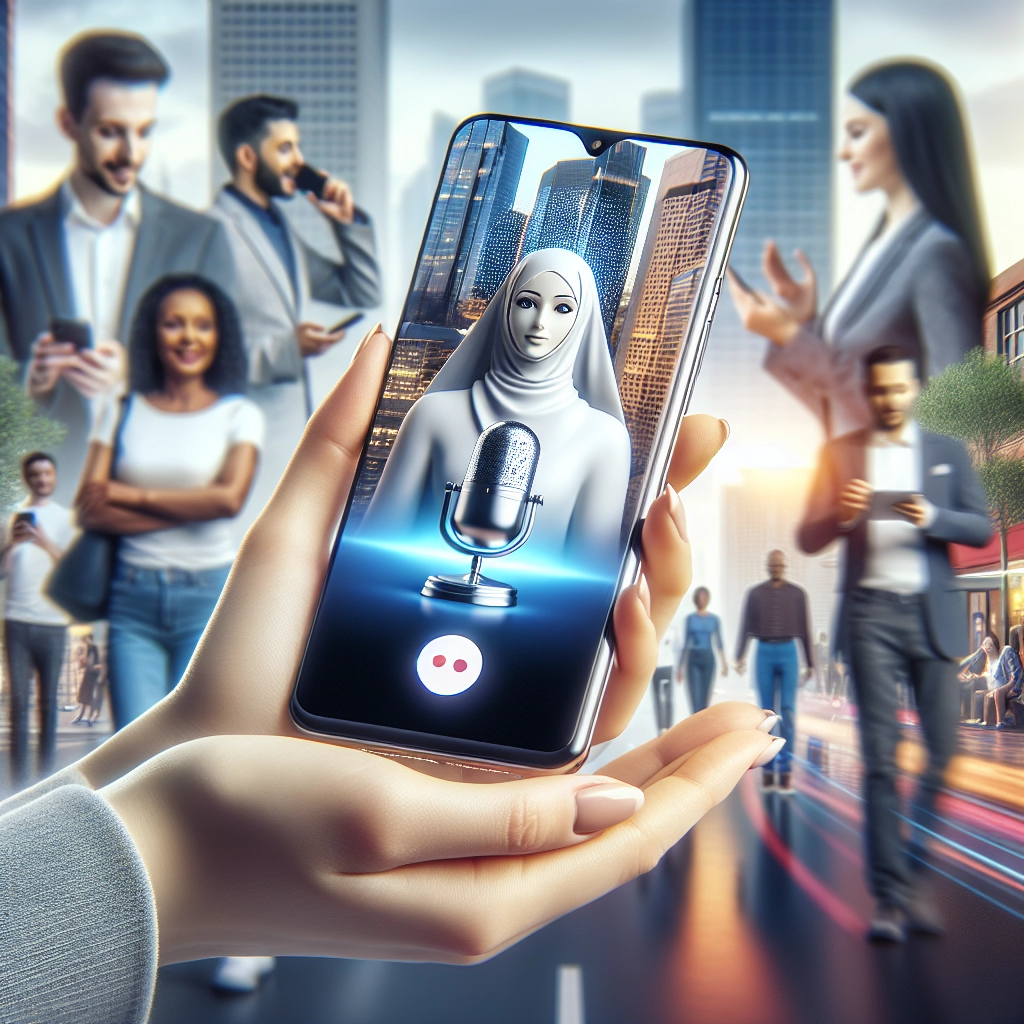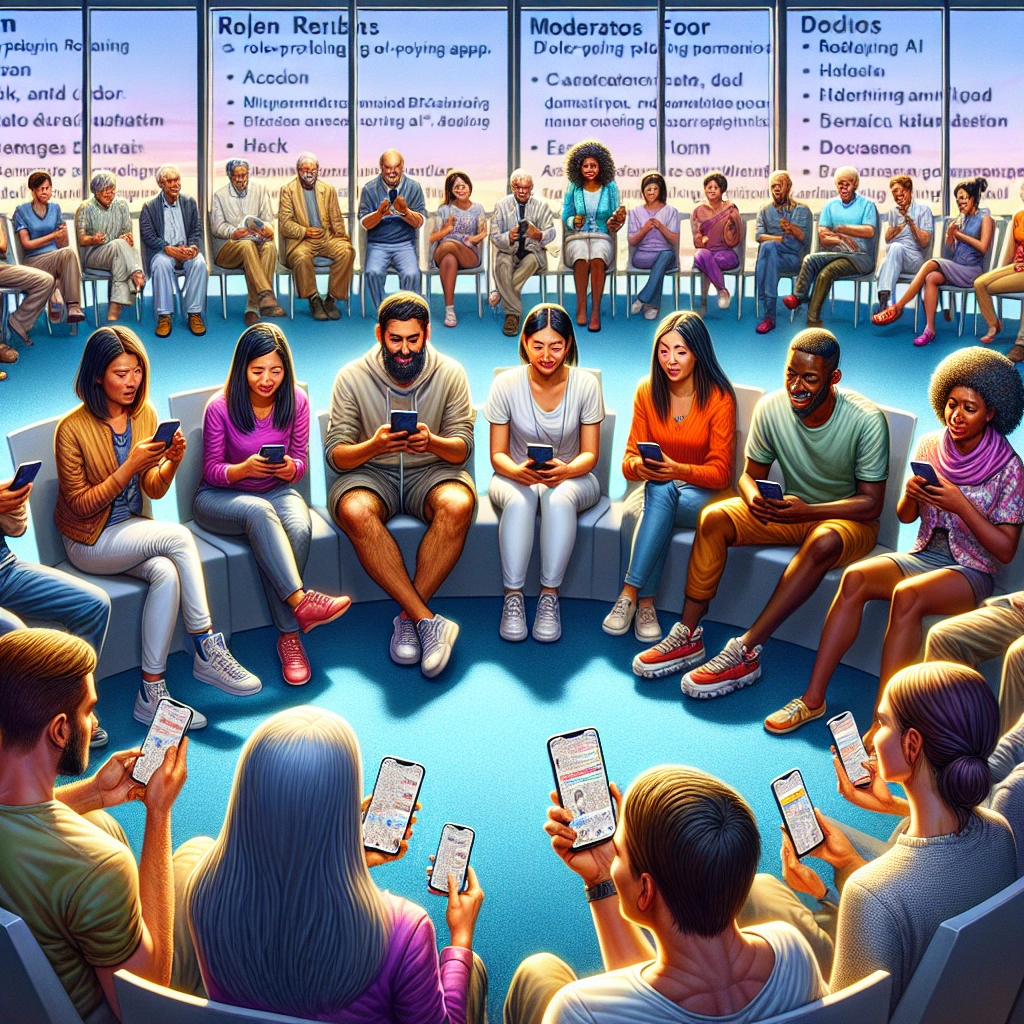

AI apps are becoming increasingly prevalent in everyday life, impacting social interactions and communication. With the integration of AI technology, these apps have the ability to automate certain tasks, such as responding to messages, making them more efficient and convenient for users.
The role of AI apps in social relationships and communication is continuously growing, offering various benefits and advancements in how people connect and communicate with each other.
Understanding the Role of AI Apps
Definition of AI apps and their purpose
Artificial Intelligence (AI) apps are software applications that utilize machine learning and data analysis to mimic human intelligence and perform tasks traditionally requiring human cognition. These apps are designed to automate decision-making, optimize processes, and provide personalized user experiences.
Their purpose spans various industries, including healthcare, finance, marketing, and customer service, revolutionizing how businesses operate and interact with customers.
The evolution of AI apps in the digital age
The evolution of AI apps in the digital age has surged with advancements in deep learning, neural networks, and natural language processing. From chatbots and virtual assistants to predictive analytics and autonomous vehicles, AI apps have significantly transformed how technology enhances daily life and business operations.
As technology continues to advance, AI apps are becoming more sophisticated, offering enhanced functionalities and reshaping the digital landscape.
The Benefits of AI Chat Apps
Improved customer service through AI chatbots
AI chatbots offer immediate assistance to customer inquiries, providing real-time responses without the need for human intervention. They reduce hold times, provide information upfront, and personalize the customer experience, leading to increased satisfaction, improved engagement, and loyalty.
Examples of companies successfully utilizing AI chatbots for improved customer service include IBM and Zendesk.
Personalized recommendations and experiences
Chatbots can analyze customer preferences and behavior to deliver personalized recommendations, using ML algorithms to provide tailored product or service suggestions. This not only enhances the user experience but also increases the likelihood of conversions.
By understanding a customer’s preferences, businesses can deliver tailored content and messaging that resonates with them, resulting in increased satisfaction, loyalty, retention, and revenue.
Streamlined communication and task management
AI chatbots equipped with natural language processing capabilities can streamline communication by providing multilingual support and facilitating real-time translation. They ensure everyone has access to the latest information, reducing confusion and improving efficiency.
Additionally, AI-based personalization helps in improving the customer experience by offering more personalized experiences.
| Benefits | Examples |
|---|---|
| Improved customer service through AI chatbots | IBM, Zendesk |
| Personalized recommendations and experiences | Increased customer satisfaction, loyalty, and retention |
| Streamlined communication and task management | Multilingual support, streamlined information sharing, and improved efficiency |
The examples here provide real-world evidence of the benefits of AI chat apps, highlighting their effectiveness in providing improved customer service, personalized experiences, and streamlined communication and task management.
The Role of AI in Virtual Assistants
Integration of AI into virtual assistant apps
AI has revolutionized virtual assistant apps by enabling them to understand and generate human-like language responses using Natural Language Processing (NLP), making interactions more seamless and human-like. It also involves Emotion AI, allowing virtual assistants to monitor human emotions by analyzing facial expressions, body language, or speech, thus enhancing the user experience.
How AI enhances the functionality of virtual assistants
AI enhances the functionality of virtual assistants by allowing them to comprehend user queries, provide relevant information, and offer personalized recommendations through NLP algorithms. It assists virtual assistants in analyzing and organizing large volumes of data, extracting relevant information, and presenting it in a concise and actionable format, enabling quicker access to needed information and efficient task completion.
Examples of popular virtual assistant apps utilizing AI technology
- Google Assistant: Leveraging generative AI and NLP, Google Assistant showcases the role of AI in enhancing its functionality.
- Socratic: This AI-powered app specializes in helping students with mathematics and other homework, utilizing cutting-edge AI and expert-made teaching content to assist students effectively.
| Virtual Assistant App | AI Technology |
|---|---|
| Google Assistant | Generative AI and NLP |
| Socratic | Cutting-edge AI and expert-made teaching content |
The integration of AI has transformed virtual assistant apps, making them more intuitive and user-oriented, thereby enhancing the overall user experience.
AI Apps in Social Networking
AI-driven features in social networking and messaging apps
AI-driven features in social networking and messaging apps have revolutionized the way users interact with content. For example, AI algorithms can analyze user behavior to personalize content recommendations, enhancing user engagement and experience.
These features enable advanced content curation based on individual preferences, leading to more meaningful interactions.
The impact of AI on user engagement and experience
The impact of AI on user engagement and experience is profound, as it facilitates tailored content delivery and personalized recommendations. AI tools integrate seamlessly with social media platforms to schedule and optimize content posting, ensuring maximum user engagement.
This personalized approach enhances the overall user experience, leading to increased satisfaction and extended time spent on social networking platforms.
Discussion of privacy concerns and mitigating strategies
Privacy concerns regarding AI in social networking revolve around data breaches and unauthorized access to personal information. Ethical considerations are paramount, especially in the context of privacy and surveillance.
Mitigating strategies involve stringent data privacy measures, transparency in AI usage, and robust security protocols to protect user data from potential risks.
The Ethical Considerations of AI Chat Apps
Addressing ethical dilemmas surrounding AI chat apps
AI chat apps raise ethical concerns regarding biases in data training, leading to biased decisions and responses. Furthermore, there are controversies surrounding the representation of the chatbot.
It’s essential for developers to ensure that their chatbots are trained on diverse and representative data to avoid perpetuating bias and discrimination.
Ensuring responsible use of AI technology in chat applications
To ensure responsible use of AI technology in chat applications, it is crucial to train AI chatbots ethically by sourcing data from diverse and representative sources. Additionally, explicit steps should be outlined to remove, minimize, and mitigate bias in AI-powered interventions, particularly for disadvantaged groups.
The role of regulations and guidelines in AI app development
The development of AI chat apps requires a regulatory framework that ensures trust and responsible use. As of now, regulations such as the European Parliament’s Artificial Intelligence Act are being adopted to ban or limit specific high-risk applications of AI.
Moreover, the U. S. is expected to witness advancements in AI regulation in 2023 to prepare companies for the changing regulatory landscape.
| Addressing Ethical Dilemmas | Ensuring Responsible Use | Role of Regulations | |
|---|---|---|---|
| Bias | Data training for unbiased decisions | Ethical sourcing of training data | Adoption of regulatory framework |
| Representation | Controversies surrounding chatbot representation | Steps to mitigate bias in AI-powered interventions | Implementation of the Artificial Intelligence Act |
Leveraging AI Technology for Personal Development
AI apps for mental health and wellness
AI-based mental health apps like MindDoc, Meru Health, Wysa, and Replika are leading the charge in offering personalized support for anxiety, depression, stress, and sleep-related issues. These apps leverage AI to tailor advice and exercises to the unique needs of users, making mental health support more accessible and effective.
Educational and language learning AI apps
AI-powered language learning apps, such as those using NLP algorithms, machine learning, and speech recognition, can significantly enhance the language learning process. They provide personalized content and guidance, enabling learners to achieve their language learning goals more efficiently and effectively, thereby making education and language learning more engaging and impactful.
The potential impact of AI apps on personal growth and development
AI has the potential to revolutionize personal development by offering precise, personalized, and data-driven guidance. Through analyzing goals, preferences, and progress, AI can suggest specific resources, strategies, and steps to help individuals achieve their personal growth objectives.
AI’s impact on education and personal development is undeniable, as it guides personalized paths for growth and provides transformative learning experiences.
Using AI Apps in Professional Settings
Applications of AI technology in the workplace
AI technology is revolutionizing the workplace by streamlining operations, automating repetitive tasks, and offering data-driven insights for informed decision-making. One prime example is the use of AI-powered chatbots for instant customer support, which enhances efficiency and delivers an improved customer experience.
Additionally, AI is being employed in work simulations for employee training, performance evaluation, and benefits enrollment, leading to more effective and personalized learning experiences.
Enhancing productivity and collaboration through AI apps
AI apps contribute significantly to enhancing productivity and fostering collaboration within teams. By leveraging AI, businesses can analyze consumer behavior, identify bugs, and boost productivity, ultimately improving overall operational efficiency.
Asynchronous collaboration, facilitated by AI, provides the flexibility modern teams need to balance productivity with work-life balance, promoting a dynamic and effective working environment.
Addressing concerns about AI replacing human jobs
Despite the benefits of AI, there are concerns about its potential to replace human jobs. The World Economic Forum’s “The Future of Jobs Report 2020” predicts that AI is expected to replace 85 million jobs worldwide by 2025. While AI may lead to job displacement, it also creates new opportunities and roles that require human skills, ultimately reshaping the workforce and driving innovation.
| Pros of AI in the Workplace | Cons of AI in the Workplace |
|---|---|
| Increased productivity | Job displacement |
| Enhanced customer experiences | Potential for replacing human jobs |
| Streamlined operations | Reshaping the workforce |
The role of AI apps in professional settings is transformative, offering a myriad of benefits in productivity, collaboration, and operational efficiency. However, the concerns about job displacement call for a balanced approach in integrating AI into the workforce, ensuring that human skills and roles continue to play a vital part in the evolving landscape of work.
Remember, AI is a tool to enhance human capabilities, not to replace them completely!
The Future of AI Chat Apps
Predictions for the future of AI chat apps
In the near future, AI chat apps are predicted to become more personalized and contextually aware, allowing for more natural and human-like conversations. Chatbots will evolve to understand and respond to emotions, providing empathetic and tailored interactions.
Integration with augmented reality (AR) and virtual reality (VR) will enhance user experiences, enabling immersive and interactive conversations.
Emerging trends and innovations in AI technology
The emerging trends in AI technology for chat apps include the adoption of advanced natural language processing (NLP) models such as GPT-4, enabling chatbots to generate more coherent and contextually relevant responses. Additionally, voice-enabled AI chat apps will see significant growth, leveraging speech recognition and synthesis technologies for seamless communication.
Furthermore, AI-driven sentiment analysis will play a pivotal role in understanding user emotions and delivering personalized experiences.
The potential impact of AI apps on society and culture
AI chat apps have the potential to catalyze significant societal and cultural shifts by fostering inclusivity and accessibility in communication. With the ability to support multiple languages and dialects, AI chat apps can bridge linguistic barriers, promoting global connectivity and cross-cultural exchange.
However, concerns regarding data privacy, algorithmic bias, and job displacement will necessitate ethical and regulatory frameworks to mitigate potential negative impacts on society.
| Predictions for AI Chat Apps | Emerging Trends in AI Technology |
|---|---|
| – Personalized and empathetic interactions | – Advanced NLP models like GPT-4 |
| – Integration with AR and VR for immersive experiences | – Voice-enabled AI chat apps |
| – Contextually aware chatbots | – AI-driven sentiment analysis |
| – Seamless communication through speech recognition | – Global connectivity and inclusivity |
Exploring Role-Playing AI Apps
Definition of role-playing AI apps and their unique features
Role-playing AI apps are advanced chatbots that utilize natural language processing (NLP) and machine learning to simulate realistic conversations. These AI chatbots are designed to engage users in interactive storytelling and immersive role-playing scenarios.
Their unique features include dynamic character interactions, personalized story generation, and the ability to learn and adapt from user input, resulting in a more human-like conversational experience.
Examples of popular role-playing AI apps
Some popular role-playing AI apps include “Replika,” a humane chatbot designed to be an empathetic companion, “AI Pal,” an AI chat simulator that immerses users in interactive adventures, and “Character AI,” which facilitates open-ended conversations with virtual characters. Additionally, “Anima” and “SimSimi” are known for providing fun and engaging AI companions, while “Flamel. AI” automates role-playing experiences for tabletop games, offering a richer gaming experience with minimal preparation.
The potential benefits of role-playing AI apps for users
Role-playing AI apps offer users the opportunity to engage in dynamic and immersive storytelling experiences, fostering creativity and imagination. These apps can also serve as empathetic companions, providing emotional support and personalized interactions.
Moreover, the use of AI in role-playing scenarios can enhance learning, problem-solving, and social interaction skills. Role-playing AI apps have the potential to create a more engaging and entertaining user experience, blurring the lines between human and artificial intelligence interaction.
| Role-Playing AI Apps | Unique Features |
|---|---|
| Replika | Humane chatbot with empathetic interactions |
| AI Pal | Immersive interactive storytelling experience |
| Character AI | Open-ended conversations with virtual characters |
| Anima | Fun and engaging AI companion |
| SimSimi | Interactive role-play scenarios and conversations |
| Flamel. AI | Automates role-playing experiences for tabletop games |
The Psychological Impact of Role-Playing AI Apps
Discussing the psychological dynamics of interacting with role-playing AI
Interacting with role-playing AI can simulate real-life social interactions, offering a sense of companionship and understanding. Users may experience emotional connections and a feeling of being heard, impacting their psychological well-being.
The potential benefits of role-playing AI apps for mental health
Role-playing AI apps can provide accessible support for individuals dealing with mental health challenges, offering a safe space for expression and reflection. The anonymity and non-judgmental nature of AI interactions can reduce stigma and encourage open communication.
Addressing concerns about the implications of role-playing AI apps on human behavior
There are concerns about the potential impact of excessive reliance on role-playing AI apps, such as reduced human-to-human interaction and emotional dependency on AI. It is crucial to explore how to maintain a healthy balance and set boundaries in AI interactions to mitigate adverse behavioral effects.
Role-Playing AI Apps in Social Skills Development
Using role-playing AI apps to enhance social skills
AI apps provide a safe environment for individuals to practice social interactions without the fear of judgment. By simulating real-world scenarios, users can improve communication, active listening, and conflict resolution skills.
The potential benefits of role-playing AI apps for individuals with social anxiety
For individuals with social anxiety, role-playing AI apps offer a low-pressure way to gradually expose themselves to social situations. This can help build confidence, reduce anxiety, and improve their ability to navigate real-world social interactions.
How role-playing AI apps can simulate real-world social interactions
Role-playing AI apps leverage advanced algorithms to mimic authentic social scenarios, including job interviews, networking events, and casual conversations. This allows users to practice and refine their social skills in a realistic and interactive virtual environment.
Incorporating Humor and Anecdotes in Role-Playing AI Apps
The role of humor and entertainment in role-playing AI apps
The role of humor in role-playing AI apps is crucial for enhancing user engagement and providing an entertaining experience. By incorporating humor and anecdotes, these apps can create a more immersive and enjoyable environment for users to interact with, making the overall experience more captivating and memorable.
Examples of humor and anecdotes in popular role-playing AI apps
Popular role-playing AI apps often integrate humor through witty dialogues, quirky character interactions, and unexpected plot twists. For example, in a fantasy RPG app, the AI characters could engage in lighthearted banter, exchange humorous one-liners, or react unexpectedly to user commands, providing a comedic touch to the gameplay experience.
The potential impact of humor on user engagement and experience
Humor has the potential to significantly enhance user engagement and experience in role-playing AI apps by creating a more enjoyable and entertaining atmosphere. By incorporating humor strategically, these apps can keep users entertained, invested, and eager to explore the immersive world, leading to increased user satisfaction, longer app usage, and higher retention rates.
| Role AI App | Being creative with humor and anecdotes in role-playing AI apps can elevate the overall user experience, making the interactions more engaging and memorable. Incorporating humorous dialogues, unexpected plot twists, and witty character interactions can captivate users, keeping them coming back for more. |
Let’s keep the role-playing AI apps intriguing and fun for everyone!
The Importance of User Feedback in Role-Playing AI Apps
The significance of user feedback in improving role-playing AI apps
User feedback plays a crucial role in enhancing role-playing AI apps by providing valuable insights into user preferences, pain points, and areas for improvement. This feedback helps developers understand the user experience and tailor the app to better serve the needs and expectations of the users.
For example, in a role-playing AI game, user feedback can guide the development team in creating more engaging storylines, diverse character interactions, and realistic dialogue options, leading to a more immersive and enjoyable gameplay experience.
Strategies for collecting and utilizing user feedback effectively
Effective strategies for collecting user feedback in role-playing AI apps involve implementing in-app surveys, open-ended feedback widgets, and user satisfaction surveys to gather real-time insights from players. Additionally, utilizing AI and machine learning to analyze this feedback can automate the process of identifying recurring themes and sentiments, allowing developers to prioritize and address the most pressing issues.
For instance, AI can analyze player feedback to identify common pain points in the game mechanics, leading to targeted improvements that align with user preferences.
The impact of user feedback on the evolution of role-playing AI apps
User feedback significantly impacts the evolution of role-playing AI apps by driving iterative development and continuous enhancement. By incorporating user feedback into regular updates and feature additions, developers can demonstrate their responsiveness to user needs, fostering greater user loyalty and retention.
Furthermore, user feedback serves as a catalyst for innovation, inspiring the introduction of new gameplay mechanics, character arcs, and narrative elements that resonate with the player community. This dynamic feedback loop fuels the evolution of role-playing AI apps, ensuring that they remain relevant and captivating in a rapidly evolving gaming landscape.
Balancing Realism and Entertainment in Role-Playing AI Apps
Finding the right balance between realism and entertainment in role-playing AI apps
AI plays a crucial role in enhancing the realism of role-playing AI apps by creating dynamic and diverse non-player characters (NPCs). These AI-driven NPCs can respond more realistically to in-game situations, making the gameplay experience more immersive for users.
Examples of successful role-playing AI apps that strike this balance effectively
One notable example of a successful role-playing AI app that strikes a perfect balance between realism and entertainment is “Skyrim.” The game leverages AI to create lifelike NPCs with unique personalities, making interactions with these characters feel authentic and engaging.
The potential challenges of maintaining realism and entertainment simultaneously
However, maintaining realism and entertainment simultaneously poses significant challenges. AI developers often face the task of ensuring that NPCs behave believably while still providing an enjoyable and engaging experience for players.
Balancing these aspects requires meticulous attention to detail and continuous efforts to refine the AI algorithms for optimal user experiences.
Addressing Concerns About Role-Playing AI Apps
Common misconceptions and concerns about role-playing AI apps
- Many people believe that role-playing AI apps can replace human interactions and relationships, but in reality, they are designed to complement and enhance social experiences rather than replace them.
- There is a misconception that role-playing AI apps lack emotional depth and empathy, but with advancements in AI technology, these apps are becoming more adept at understanding and responding to human emotions and needs.
- Concerns also arise regarding the impact of role-playing AI apps on emotional dependency, as some fear that excessive use may lead to individuals relying solely on AI for social interaction and emotional support.
Providing factual information and dispelling myths about role-playing AI apps
- Role-playing AI apps are designed to simulate human-like conversations and interactions, making them a valuable tool for practicing social skills and self-reflection.
- These apps provide a safe and non-judgmental space for users to express themselves, explore different social scenarios, and gain confidence in their communication abilities.
- Contrary to the myth that role-playing AI apps promote emotional detachment, they can actually foster empathy and understanding through simulated conversations that encourage users to consider different perspectives.
The potential impact of role-playing AI apps on social interactions and relationships
- Role-playing AI apps have the potential to enhance social interactions by providing individuals with a platform to practice effective communication and empathy, leading to improved real-life interactions.
- While concerns exist about the overreliance on AI for social interaction, when used responsibly, these apps can supplement rather than replace genuine human connections.
- The use of role-playing AI apps can potentially encourage introspection and self-awareness, leading to better self-expression and a deeper understanding of social dynamics.
| Role-Playing AI Apps | Benefits |
|---|---|
| Simulates human conversations | Enhances social skills |
| Provides a non-judgmental space | Fosters empathy and understanding |
| Supplements genuine human connections | Encourages introspection and self-awareness |
Remember folks, role-playing AI apps are not here to replace humans; they are here to assist us in becoming better at human connections. Let’s embrace the technology while maintaining the essence of genuine human interactions.
Recommended Amazon Products for Role-Playing AI Apps
Here’s a curated list of products that can help you with your role-playing AI apps. These recommendations are based on the functionality, customer reviews, and price.
D&D Dungeon Master’s Guide


The D&D Dungeon Master’s Guide is recommended for role-playing AI apps as it provides a comprehensive guide to creating immersive and engaging campaigns. It offers valuable insights into world-building, character development, and storytelling, all of which are essential for crafting compelling AI-driven narratives.
| Pros | Cons |
|---|---|
| In-depth campaign tools | May have a learning curve for beginners |
| Well-established brand | Relatively higher price point |
| Highly rated by customers | Limited to tabletop gaming enthusiasts |
Role-Playing Dice Set


A role-playing dice set is recommended for AI apps that incorporate chance mechanics and decision-making. These dice sets come in various colors and materials, allowing for a personalized and tactile experience that enhances user engagement and immersion.
| Pros | Cons |
|---|---|
| Customizable colors and materials | Limited use outside of gaming scenarios |
| Enhances user interaction and decision-making | Additional cost for multiple sets Broad appeal across different role-playing games |
Fantasy Role-Playing Costume


A fantasy role-playing costume can add a layer of visual and sensory immersion to AI apps. It allows users to physically embody their virtual characters, fostering a deeper connection and investment in the role-playing experience.
| Pros | Cons |
|---|---|
| Enhances user engagement and creativity | Limited to specific user preferences |
| Encourages physical interaction within role-playing scenarios | Additional cost and storage space required Versatile for various fantasy-themed settings |
LED Flameless Candles


LED flameless candles can be an excellent addition to role-playing AI apps that simulate atmospheric settings. These candles provide a safe and realistic way to create mood lighting, adding ambiance and immersion to storytelling and role-playing experiences.
| Pros | Cons |
|---|---|
| Safe and realistic lighting option | Limited to specific narrative scenarios |
| Battery-operated for convenience | Initial cost for acquiring multiple candles Suitable for indoor and outdoor use |
Bluetooth Speaker System


A high-quality Bluetooth speaker system can elevate the auditory experience of role-playing AI apps. It delivers immersive sound effects, music, and voice modulation, enriching the storytelling and world-building aspects of the AI-driven narratives.
| Pros | Cons |
|---|---|
| Immersive sound quality and effects | Initial investment for quality speakers |
| Wireless and portable for versatile use | Additional setup and pairing required Compatible with various devices and apps |
Top Recommended Product for Role-Playing AI Apps
If you’re looking for the best solution for role-playing AI apps, we highly recommend the D&D Dungeon Master’s Guide(https://www.amazon.com/s?k=D%26D+Dungeon+Master%27s+Guide). The guide offers comprehensive tools for world-building, character development, and storytelling, essential for crafting engaging AI-driven narratives.


Ready to enhance your role-playing AI apps? Check out the D&D Dungeon Master’s Guide today for the best results!


Conclusion
AI apps continue to play an increasingly significant role in various aspects of life, from healthcare and finance to entertainment and education. As technology continues to advance, AI apps are expected to become even more integrated into everyday activities, improving efficiency and simplifying tasks for individuals and organizations.
The growing role of AI apps presents potential benefits, such as increased productivity, personalized experiences, and improved decision-making processes. However, it also brings about challenges, including privacy concerns, ethical considerations, and potential job displacement.
It is important to carefully navigate these issues and address them proactively to fully realize the potential advantages of AI technology.
The evolving landscape of AI technology in communication and social interactions calls for further exploration and open-mindedness. As AI apps continue to shape the way we interact and communicate, it is crucial for individuals and society as a whole to embrace the opportunities and challenges that come with this rapidly advancing technology.
Adaptation and responsible use of AI apps will be essential in leveraging their full potential for the benefit of humanity.

















